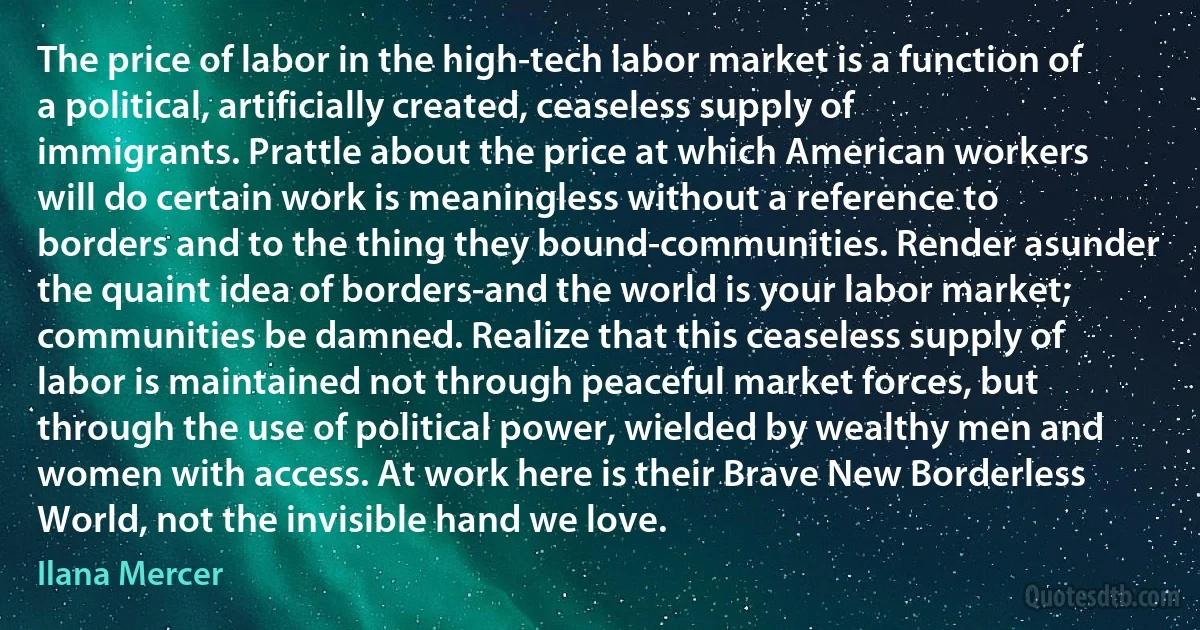
The price of labor in the high-tech labor market is a function of a political, artificially created, ceaseless supply of immigrants. Prattle about the price at which American workers will do certain work is meaningless without a reference to borders and to the thing they bound-communities. Render asunder the quaint idea of borders-and the world is your labor market; communities be damned. Realize that this ceaseless supply of labor is maintained not through peaceful market forces, but through the use of political power, wielded by wealthy men and women with access. At work here is their Brave New Borderless World, not the invisible hand we love.
Ilana MercerRelated topics
brave certain hand women idea men labor love market power prattle price quaint thing use wealthy work worldRelated quotes
I have presented the periodic table as a kind of travel guide to an imaginary country, of which the elements are the various regions. This kingdom has a geography: the elements lie in particular juxtaposition to one another, and they are used to produce goods, much as a prairie produces wheat and a lake produces fish. It also has a history. Indeed, it has three kinds of history: the elements were discovered much as the lands of the world were discovered; the kingdom was mapped, just as the world was mapped, and the relative positions of the elements came to take on a great significance; and the elements have their own cosmic history, which can be traced back to the stars.

Peter Atkins
You may not be her first, her last, or her only. She loved before she may love again. But if she loves you now, what else matters? She's not perfect-you aren't either, and the two of you may never be perfect together but if she can make you laugh, cause you to think twice, and admit to being human and making mistakes, hold onto her and give her the most you can. She may not be thinking about you every second of the day, but she will give you a part of her that she knows you can break-her heart. So don't hurt her, don't change her, don't analyze and don't expect more than she can give. Smile when she makes you happy, let her know when she makes you mad, and miss her when she's not there.

Bob Marley
Actually, the labor market was allowed to retain its main function only on condition that wages and conditions of work, standards and regulations should be such as would safeguard the human character of the alleged commodity, labor. To argue that social legislation, factory laws, unemployment insurance, and, above all, trade unions have not interfered with the mobility of labor and the flexibility of wages, as is sometimes done, is to imply that those institutions have entirely failed in their purpose, which was exactly that of interfering with the laws of supply and demand in respect to human labor, and removing it from the orbit of the market.

Karl Polanyi
The smallest unit of the institutional economists is a unit of activity - a transaction, with its participants. Transactions intervene between the labor of the classic economists and the pleasures of the hedonic economists, simply because it is society that controls access to the forces of nature, and transactions are, not the "exchange of commodities," but the alienation and acquisition, between individuals, of the rights of property and liberty created by society, which must therefore be negotiated between the parties concerned before labor can produce, or consumers can consume, or commodities be physically exchanged.

John R. Commons
With quaint manners and quaint names these men had the hero's heart and the confessor's faith. Their faith was, indeed, their strength. Strong in the supremacy of conscience, in that real earnestness which springs from conviction, and which prompts to enterprise; far-sighted in political sagacity, because seeing Him that is invisible; shrewd enough to know that the truest policy for the life that now is, is a reverent recognition of the life that is to come, they were brave in endurance and patient under trial; and never losing sight of the principle for which they struggled, and of the purpose of their voyage afar, they "won the wilderness for God."

William Morley Punshon
